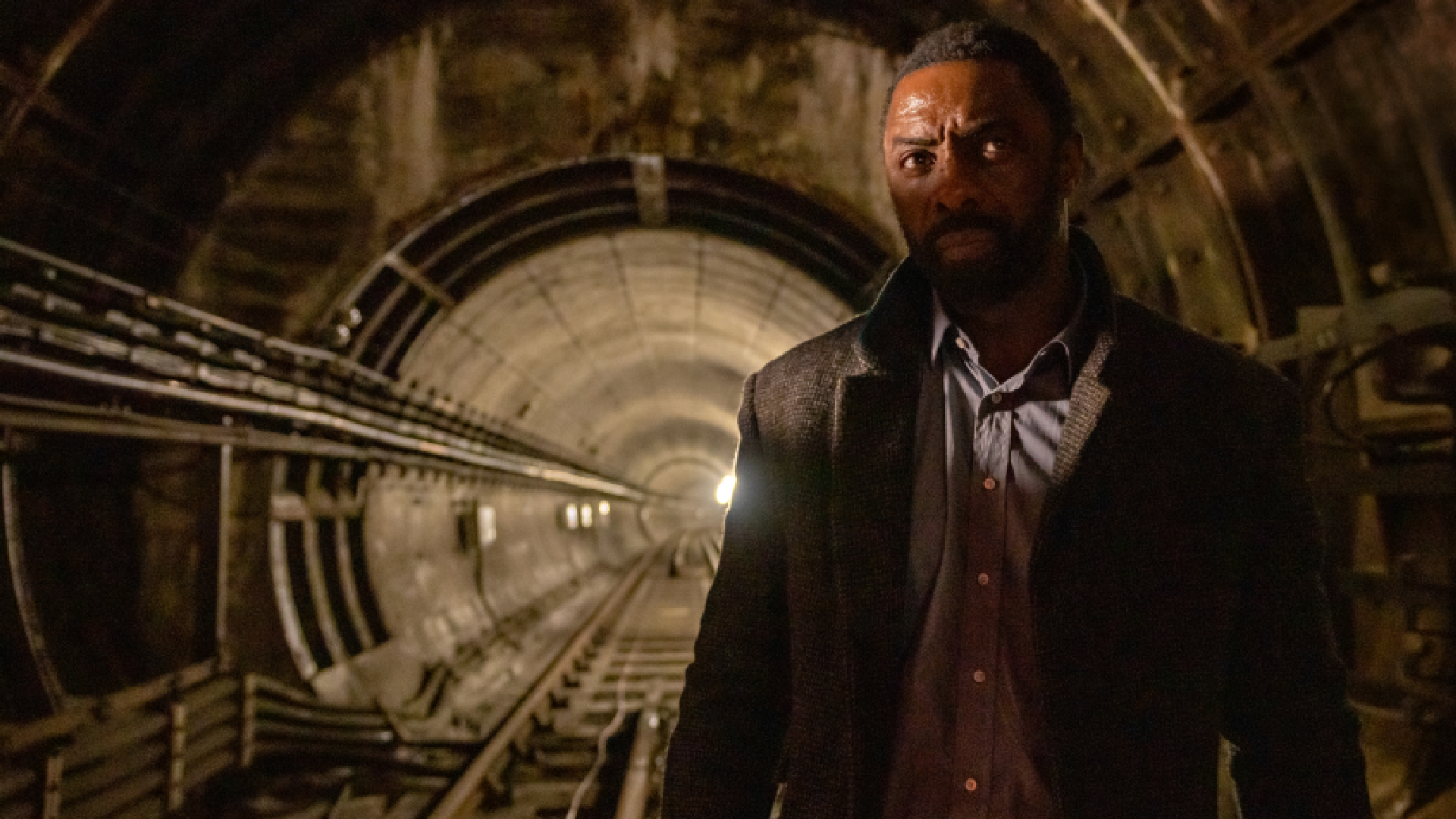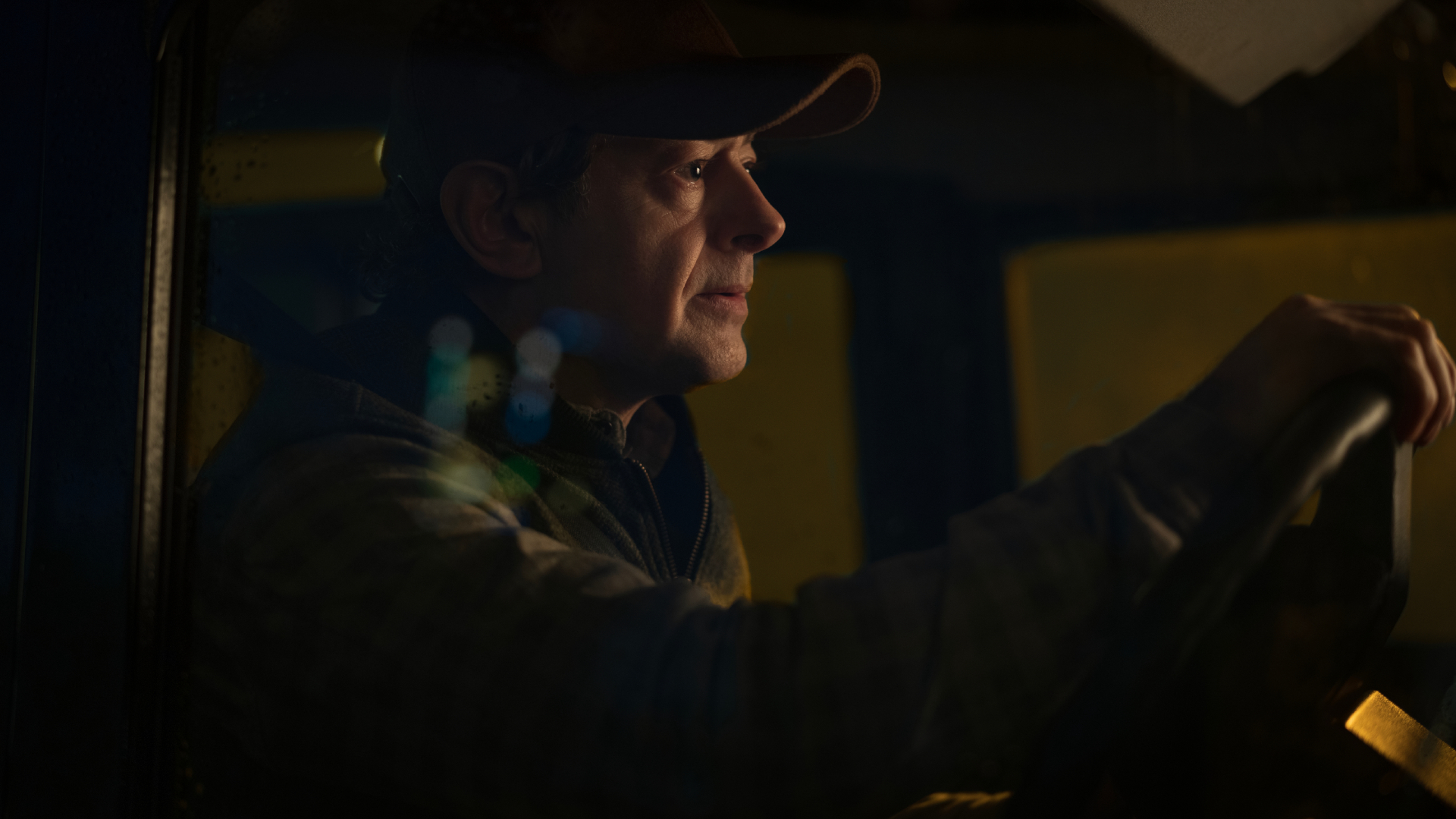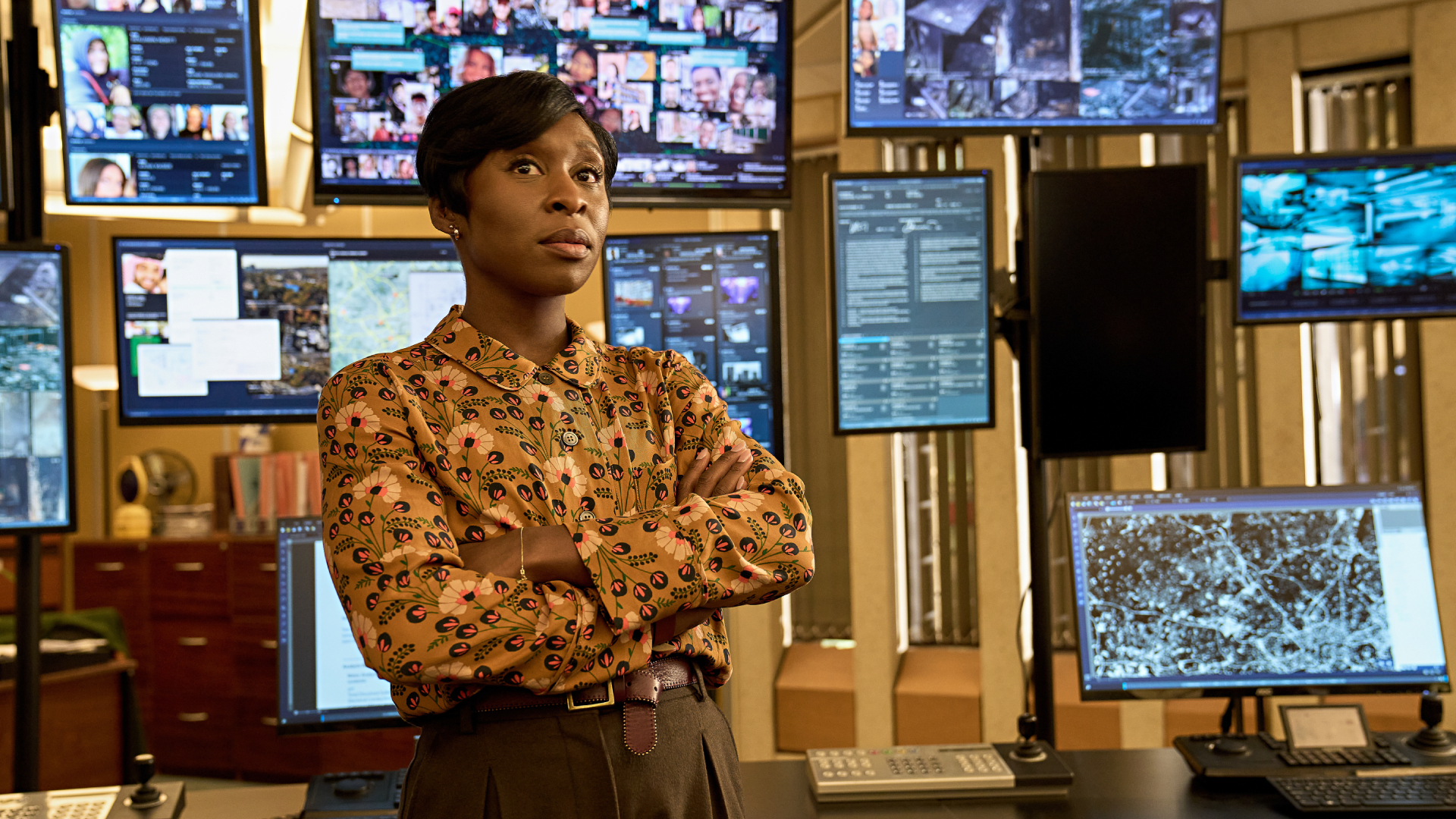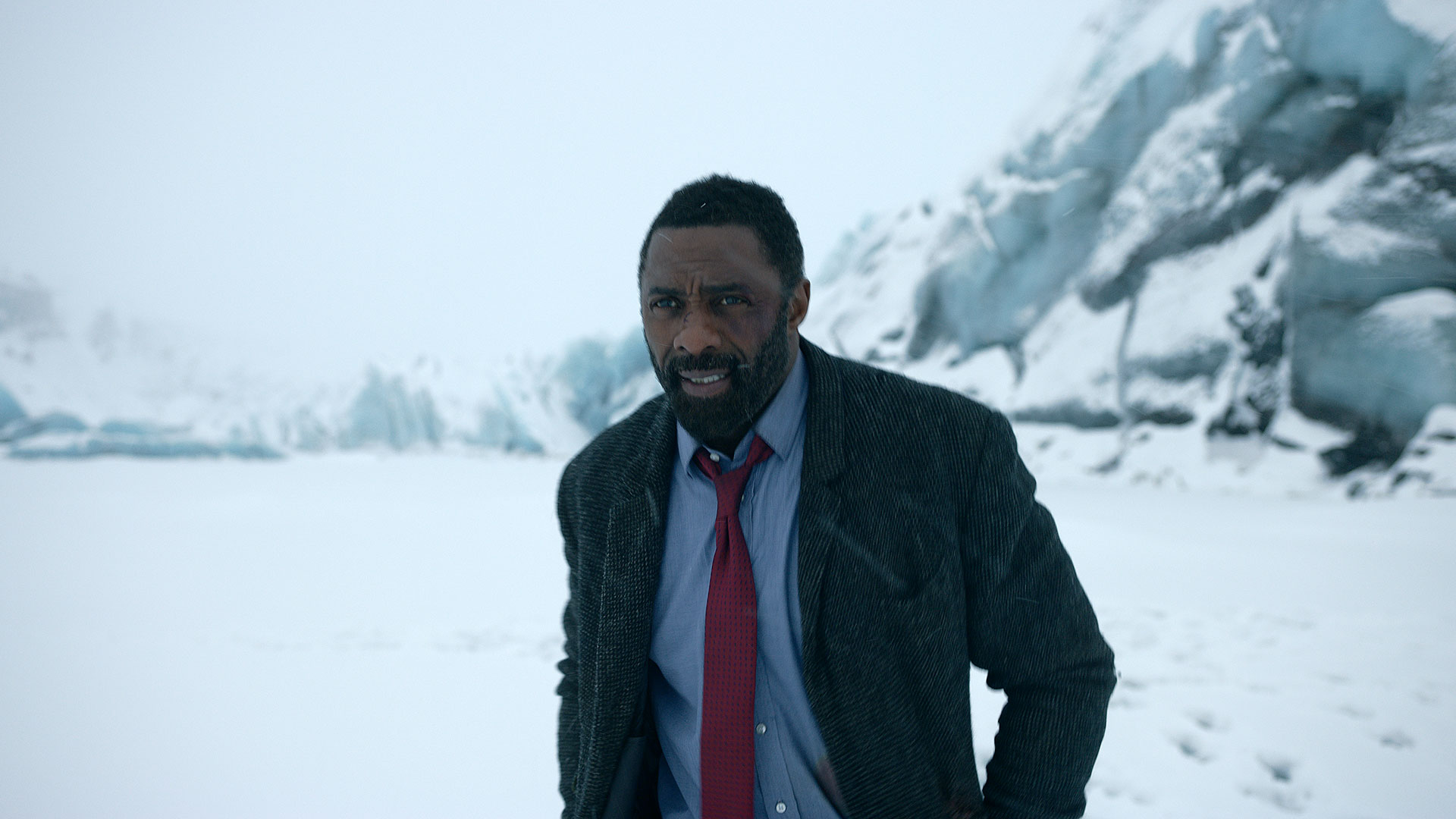Idris Elba and the Luther: The Fallen Sun team on expanding the DCI's story with a Netflix movie
Exclusive: Idris Elba and his team tell Total Film why morally compromised Luther can take on 007 in the movie stakes…

Idris Elba’s small-screen DCI eyes a feature franchise with a step up in scale and ambition in Luther: The Fallen Sun, now out on Netflix. This cover feature article first appeared in the January 2023 issue of Total Film magazine. You can purchase a hard copy here.
John Luther is in West London. He’s abandoned his usual stomping ground of Hackney and environs for a Hangar Lane photo studio and is currently looking mean and moody down the lens of a clicking camera while rap tracks boom over the sound system. Well, we say Luther – but the man who plays him is, after five seasons essaying the conflicted TV detective, so embedded in the character that his alter-ego appears as soon as he slips on the iconic Paul Smith overcoat and red tie. Six feet two inches of imposing Idris Elba channelling a pissed-off Luther is quite the intimidating sight on a nippy November morning, so Total Film waits for the actor to slip into hair and make-up later before tackling some police questioning.
So the intel for those just coming into this investigation? Neil Cross-created DCI John Luther started out on the BBC in 2010 as a brilliant Serious Crime Unit detective with an estranged wife he was trying to woo back as he stalked the most depraved murderers the capital had to offer. One of those wily crims was Alice Morgan (played by Ruth Wilson), a sociopath who became Luther’s nemesis and then companion as his ex and work partners were murdered, and his world became morally murkier. By the end of 2019’s Series 5, Alice was dead after a lethal fall (or is she?) and Luther was in handcuffs. A copper who’d bent the law to pursue the worst of the worst, the finale left viewers with a tantalising cliffhanger: would big John rot in jail or would his determination to hunt down wrong ’uns provide further adventures?
"Luther has got more in common with The X-Files than Inspector Morse," says creator Neil Cross when TF catches up with him from his New Zealand home. "It’s not a crime show. It’s a monster show." And to that end, like The X-Files, perhaps it was always destined to become a feature film. Certainly for Cross and Elba, that ambition had been a natural progression as they built their show and won awards. Cross, who admits to a fear of the dark but has conceived a selection of blood-freezing baddies over the show’s run (Season 2’s Punch mask murderer, Season 3’s ‘man under the bed’, Season 5’s night-bus killer), has always felt that Elba’s towering performance as world-weary Luther deserved a cinematic outing.
"He’s got a titanic sense of presence, a once-in-a-generation movie-star quality. But what I love about the way he portrays this character, is that Idris’ charisma, physical beauty and his physical power ultimately takes second place to an essential tenderness. One of the key characteristics of the character is that he’s clearly carrying around a wound. When Idris and I were first having conversations about who he was, and what he looked like, and what he drove, one of my most important criteria was that we never, ever even attempt to try to do anything cool. That’s part of the reason why I’m so addicted to using slightly antediluvian London slang, rather than cool, hip Who’s that bloke in the waterproof jacket? Nope, don’t recognise him. Cynthia Erivo plays Luther’s successor, DCI Raine. words – I love putting the words ‘tickety-boo’ or ‘wotcha’ into Idris Elba’s mouth. Nobody’s said ‘wotcha’ in London since Dennis Waterman was playing Just William!"
He and Elba began discussing the possibility of a movie as early as the second series, despite Cross’ misgivings about other unsuccessful TV-to-film jumps ("I’m haunted by the memory of Holiday On The Buses and Steptoe And Son," he admits). "We always wanted to do it because I felt that there is a real treasure box of stories," says Elba as fake bruises are wiped off his face. "For Neil and I it was like: 'Wow, it’s one thing to be on TV…' But we always knew that we could slow it all down, take the time to be filmic, and take the audience on a real, big journey. What we want Luther to have as a film, is for people to walk out of a cinema, whether they know him or not, and go: 'What do you think Luther would do right now?'"
Scale up

"The trick of moving from a small screen to a big screen is to maintain the integrity and continuity of that character," continues Cross. "Rather than: ‘What can we do with this bigger budget and this bigger scale?’ – it’s: ‘How would Luther react in this circumstance?’ So although we’re on a much, much bigger scale, which both of us find very exciting and satisfying, it’s still incredibly important to both of us that this is a story with Idris Elba’s Luther at the heart of it."
Sign up for the Total Film Newsletter
Bringing all the latest movie news, features, and reviews to your inbox
The duo worked with the BBC and Netflix to transfer Luther from limited series to cinematic event, bringing along their Season 5 director, Jamie Payne. Starting the story where the show ended, with Luther in prison, Cross made sure to write for both fans and newbies alike as he conceived a big bad who could challenge the miffed former DCI. "It was important to all of us that we absolutely want to bring the fans along, and for them to know that this story sits within a canon of so many other stories," says Payne from finishing his final mix of the film in Pinewood Studios. "But also you could come at it not having seen a single episode of Luther, and absolutely know where you stood."
That scenario then is that Luther’s incarceration allows "not just our killer, but a series of other killers to roam the streets with a little bit more terrifying swagger, knowing that Luther is behind bars," Payne explains. "But the more terrifying our killer’s MO becomes, the more likely our hero is going to find his way to stand on the wall of our nightmares, and say: ‘You’re not coming in. Not on my watch.’"
That killer? Millionaire David Robey, a man tapping into zeitgeist fears of our tech spying on us and the potential of the dark web. Robey has tangled with Luther before and been ignored. Now he uses tech as surveillance, discovering secrets that enable him to manipulate others. "If you and I had a big secret that we want no one to know, he loves the idea that he can be like: ‘I know what that is. Come over and do this for me,’" shudders Elba.
"Robey really just comes from this tension between morality and ethics," says Cross, admitting all his monsters are what he’s personally afraid of. "True morality is the kind of behaviour that you exhibit when you know that nobody is watching. But we’ve ceded lots of that private behaviour to the semi-private forum of the internet. The things of which we are ashamed, the things we think that we’re ashamed of thinking, people that would have lived isolated lives but possibly never expressing their desires or their anxieties – or their interests, shall we say? – they find communities. I’m terrified by the idea that somebody, in fact, is watching. And it’s not God. It’s the opposite. We’ve all got these monsters in common. But however broad our canvas is, it’s always going to be this very particular sense that the monster could be coming for you next. In a weirdly Freudian fashion, I’ve made up a modern, Arthurian knight-errant who can come along and slay these dragons for me."
The team knew they needed an actor who could go toe-to-toe with Elba’s Luther as his adversary and sent the project to Andy Serkis to consider. "When I first read the script, I almost wanted to throw it in the bin and have a shower," laughs Serkis. "I don’t think I’ve come across anything quite as dark for a long time. And I thought: ‘In fact, do I really actually at this point in the world and time and my life, want to go down this particular rabbit hole of something that’s so hard to fathom in humanity?’"
That darkness takes in the idea of communities bound by shared unpleasant tastes and morals ("incels, I suppose you could call them, or people who have no real connection to other human beings in a meaningful way"), of cancel culture and spyware. And as Serkis sees it, our real fears of societal and personal nadirs are what make watching them enacted so satisfying. "You look at any streaming platform, and there’ll be a number of true-crime cases and then detective stories. And I think [our fascination] is that real search for what we’re really capable of."
You’re gonna need a bigger coat

Thanks to Robey’s nefarious activities, Luther isn’t going to spend his whole film in the clink. Which means shedding prison uniform and donning that famous coat and tie to pursue evil beyond the London circular. "John almost feels like a superhero – he doesn’t wear a cape, he wears a coat," says Elba. The demands of costuming on a feature film meant that the team needed 10 versions of the coat, a discontinued classic. That meant tracking down the last bolts of the material that designer Paul Smith had originally used and tailoring new threads for Elba – but aptly, the new fits were tinkered for a larger format. "We observed the scale," says Elba. "Television always looks like television, even though it’s using the same equipment. But with film you get a bit more depth. And when you have that much depth, we made the coat slightly wider, slightly bigger, a bit thicker. So when you see it in a film, because the scale’s so big, it just fits in. It calibrates itself."
And we can expect a purposeful superhero moment with the look. "Because the tie is such an integral part to the superhero outfit that is part of Luther – when that tie went on, when that outfit became complete, was something that was carefully plotted," says Payne. "Idris really wanted to track that moment where the audience see the full outfit for the first time."
Speaking of tracking – it’s not just Luther who’s chasing his quarry. As a fugitive from justice, Luther is being hunted by the police force he was once part of. His role at the SCU has been filled by single mum and hardass DCI Raine, played by Cynthia Erivo. "She’s tough but she’s also got a bit of a bee in her bonnet about John being this guy that broke the rules," says Elba.
"DCI Raine Is Luther’s equal and opposite," explains Erivo from the set of Wicked where she’s currently being painted green daily to play Elphaba. "She is by the book, by the law, every step of the way until she is pushed by circumstances outside of her control. That’s the way most people are, both darkness and light." Raine also acts as a moral compass within Luther’s descent to darkness, according to Payne. "It’s important that Luther is tested – our perception of his morality and his morality is tested. That’s something that’s always happened within the Luther lore."
Bond ambition

Luther lore and Luther-land are terms the whole team use repeatedly when discussing maintaining the continuity and tone of the character. That Luther operates within a heightened sense of London ("We shoot London to look like Gotham," says Elba) and within a set of rules dictated by a decade of his narrative evolution. But expansion now means that though Luther will visit well known London landmarks – "We want London, to a new audience, and an international audience, to be instantly recognizable," says Elba – his world opens up to an international stage. That includes action sequences in an unidentified snowy location – though he’s still wearing his beloved coat regardless of the weather. Globetrotting British badass with excellent tailoring and little regard for authority? Remind you of anyone?
"It’s not a competition, but I reference Bond as a template for the type of film we’re going for," says Elba, who’s long been touted as a successor to Daniel Craig’s 007. "John is a leading character in a film that he’s the hero of. That’s the comparison I’m making. Some films do them well – Bond is one of them. But my ambition for it is to have that sort of scale, that reverence. I want people to be like: ‘Ooh! Luther, the first film? Wicked.’ And to continue that. And then maybe later down the line, when I’m too old, someone else will step in to play John." Payne is similarly unafraid of mentioning the famous secret agent. "Luther is our Bond. Luther is the person that will stand between us and harm. I don’t believe I would meet a Bond villain. I don’t think they’re interested in me. But my worst fear is that a lot of the Luther villains would be. And I think that what makes him our Bond is that he will push himself beyond all natural ability to protect you."
For Serkis and Erivo, this is a rougher, grittier take on the lone wolf battling baddies. "It’s rough-edged – the dirty, murky end of Bond’s swimming pool," says Serkis. "Luther has this undeniable grit that runs through its DNA," agrees Erivo. "What is new and I think really exciting is that Luther is starting to branch outside of the UK and into the wider world, and I think that is the thing that makes it grow from a series to a franchise."
Ah, the F word. Elba is unapologetic about his desire to make Luther multi-movie. "One hundred per cent, it is a franchise. We’re desperate to take Luther out of Luther-land, and put him in the big world. I think that’s a really important characteristic of scale and growth in our films. I mean, can you just imagine John in Colombia, or darkest Berlin where it’s really weird and underground? Luther could go to America if we want to do that. That, to me, is exciting. And taking the rules of Luther-land and transposing them to different environments is really exciting for us."
"Expanding Luther-land starts with London then expanding into other territories," says Payne. "I know Neil [Cross] is plotting quite heavily what the future stories would be. When Luther comes out of prison the world is different, and I think it allows for a whole slew of new stories. Then the [TV] series is a brilliant origin story to what this new world would be."
With both Erivo and Serkis expressing scope for, and interest in, their characters continuing into future exploits, the question remains what Cross might have in store for Luther should audiences demand more. Perhaps even a return of Alice?
He chuckles. "This is going to make me sound like a terrible human being but one of the things that I love about writing Luther is thinking: ‘What can I put him through next?’ Putting that character through the wringer, through hell, is one of the great, perverse joys of my life." Not so tickety-boo then, but Elba is up for the challenge. "Alice was our biggest antagonist ever, and she ended up staying with the show as a character because of how big she was. And now we can try to do that with characters who live throughout the time-scale of the film – you know, picture one, picture two, picture three…" Who needs Bond, eh?
Luther: The Fallen Sun is on Netflix now. For more to stream, here's our guide to the best Netflix movies and the best Netflix shows.
Jane Crowther is a contributing editor to Total Film magazine, having formerly been the longtime Editor, as well as serving as the Editor-in-Chief of the Film Group here at Future Plc, which covers Total Film, SFX, and numerous TV and women's interest brands. Jane is also the vice-chair of The Critics' Circle and a BAFTA member. You'll find Jane on GamesRadar+ exploring the biggest movies in the world and living up to her reputation as one of the most authoritative voices on film in the industry.


